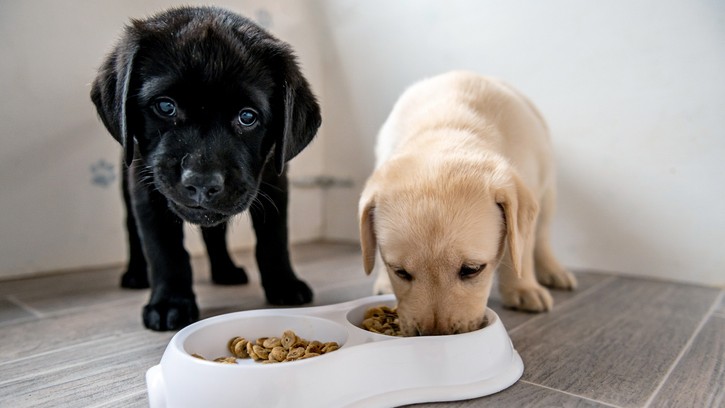Which dog food is best? A vet's guide to choosing the right diet for your dog
Overwhelmed in the pet food aisle? Find out which dog food is best

Get the best advice, tips and top tech for your beloved Pets
You are now subscribed
Your newsletter sign-up was successful
You want the best for your dog, but when it comes to dog food, which one is best? Is it dry dog food, wet dog food, or even raw dog food? With all the conflicting information about pet food out there, it can be tough to figure out which products will be the best for your dog.
It’s important to note that there is no one dog food that is 'best' for every dog. Just like a person, your dog has unique needs, and what works for one dog may not always be the best option for another. Fortunately, choosing an appropriate diet for your dog is easy once you learn to read a pet food label to find products that address their needs. Check out these tips to find out which dog food is best for your dog.
- Best dog food for allergies: Keep your canine companion fighting fit with these hypoallergenic foods
- Best dog treats: Six ways to let them know they've been a good boy or girl
Know your dog’s life stage to choose which dog food is best
As your dog grows and ages, his nutritional needs change. When deciding which dog food is best, it is important to find a food that supports your dog’s current life stage. To do this, check the back label of the pet food bag. You should be able to find a statement that says something like 'formulated to meet the needs of growing puppies' or 'for the maintenance of adult dogs'. Puppies should always be eating the best puppy food until they are fully grown, which for most breeds occurs around one year of age. Be wary of products that say they are for 'all life stages' – although these products can be useful for pregnant, lactating, or growing dogs, they are often too high in calories for the average adult, and may cause excess weight gain. If your dog’s current dog food is not specifically formulated for his life stage, it may be time to make a switch.
Consider your dog’s health and lifestyle when deciding which dog food is best
If your dog is a couch potato, chances are he doesn’t need that high-performance diet packed with fat and calories. Similarly, if your dog has digestive issues or other health concerns, you’ll need to choose a diet that takes these factors into account. The best dog food for your dog will depend on a wide variety of factors, including:
- Breed
- Age
- Weight and body condition score
- Health status
- Lifestyle and activity level
- Any chronic health issues or risk factors
- Your dog’s taste and texture preferences
- Your budget
It is also important to consider the calorie content of the food you choose and how this will affect your dog’s portion sizes. Just like the foods we eat, every dog food will have a different calorie content per serving. When changing your dog’s food, it’s important to check this information on the back of your food bag so you don’t accidentally feed your dog too many calories!
Look under the nutritional information to find the calorie content per cup of food. Your veterinarian can calculate your dog’s required daily calorie intake to help you determine how many calories your dog should consume at each meal. Don’t use the feeding guide on the back of the bag – you’ll likely be feeding your dog too much, especially if your dog is already overweight!
If your dog struggles with obesity, you may need to opt for lower-calorie dog foods or use smaller portion sizes to prevent excess weight gain. Don’t forget to factor in any treats or table scraps your dog may be getting, too – these can add a lot of extra calories and disrupt the nutrient balance of your dog’s diet!
Get the best advice, tips and top tech for your beloved Pets
Be wary of marketing and scare tactics
These days, it feels like everyone is making dog food, and with that comes a lot of marketing and misinformation. While it may be tempting to reach for the bag that claims to be more holistic, natural, or primal than its competitors, it is important to note that these are just marketing terms that can be used by any pet food company, regardless of the ingredients or processes used to make the food. Learning how to read a pet food label is an important skill that can help you decide which dog food is best for your dog. You can read our guide, dog food ingredients explained, for more information.
The World Small Animal Veterinary Association recommends calling the pet food manufacturer and asking important questions about the way the food is developed and tested. This will give you much more information about the safety and nutritional value of the food than simply reading the label!

Be careful of what you read on the internet
There’s a lot of misinformation on the internet, and you’ve probably already noticed that every website about dog food recommends something different! When you’re trying to choose the best dog food for your pup, make sure you’re getting your information from a reputable source. Check out the World Small Animal Veterinary Association’s Guide to Nutrition on the Internet.
You can also look for websites run by board certified veterinary nutritionists, like Tufts Petfoodology and The Kibble Queen, which will ensure you are getting science-backed information to help you make the best choices about your dog’s food. Watch out for websites that claim to rank or rate pet foods – in most cases, they’re run by people with little to no knowledge of veterinary nutrition!
Ask your veterinarian for product recommendations
While it’s tempting to turn to Google or social media for pet food advice, there’s a lot of misinformation out there, and many pet owners find themselves led astray. It’s always best to talk to your veterinarian to find out which dog food is best for your dog’s individual needs. Your veterinarian not only has training in veterinary nutrition, but is also familiar with your dog’s health history, and can suggest products best suited to your dog’s lifestyle.
If your dog needs to gain or lose weight, your veterinarian can also calculate your dog’s required daily calorie intake and recommend portion sizes to help you get your dog back to a healthy body weight. For dogs with health concerns, your veterinarian may recommend a prescription diet or a consultation with a board-certified veterinary nutritionist to ensure your dog is getting the exact balance of nutrients needed to manage his condition and maintain a good quality of life.
The best dog food? There isn’t one!
Choosing dog food can be a daunting task, but with so many options on the market, you are sure to find something that will keep your dog thriving. The bottom line is that there’s no single type of dog food that is 'best' for every dog, and you should be wary of companies that try to make this claim. Instead, learn how to choose dog food that is appropriate for your dog, and be sure to consult your veterinarian for recommendations. The best will be the one that best meets your dog’s unique needs!
Dr. Elizabeth Racine is a small animal general practice vet covering all things pet health and wellness. Her special interests include veterinary behavior, nutrition, and internal medicine.
As a freelance writer, Dr. Racine has written content for major companies in the industry such as the American Kennel Club, Merck Animal Health, Bayer PetBasics, Elanco, and CareCredit. In her free time, Dr. Racine enjoys playing trampoline dodgeball, hiking with her beagle Dasher, and spending time with her three mischievous cats.

